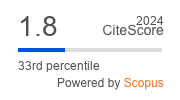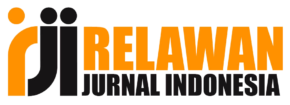Implementasi Virtual Reality Berbasis Foto 360o Untuk Memvisualisasikan Fasilitas Perguruan Tinggi Surabaya
Implementation of 360o Photo-Based Virtual Reality to Visualize Surabaya Higher Education Facilities
Abstract
The college selection process is an important phase because this process affects the future achievement targets of prospective students. One of the factors that is considered in determining a university is the supporting facilities provided during the lecture process. prospective students will continue to search and at the same time consider universities despite the pandemic COVID-19. By implementing 3600 photo-based virtual reality (VR), prospective students or external parties can get information about university facilities anytime and anywhere because it can be accessed online. This study uses the Multimedia Development Life Cycle (MDLC) method in application development, then uses a quantitative approach to test the feasibility of the application. The results showed that 3600 photo-based virtual reality (VR) is an alternative media in conveying information related to the facilities and logistics owned by universities, the variables of smoothness and convenience of operating 3600 photo-based videos have a high enough influence, but on user motivation to use VR is worth less. This happens because users are not used to using this technology.
Downloads
References
M. Ngafifi, “Kemajuan Teknologi Dan Pola Hidup Manusia Dalam Perspektif Sosial Budaya,” Jurnal Pembangunan Pendidikan: Fondasi dan Aplikasi, vol. 2, no. 1, pp. 33–47, 2014, doi: 10.21831/jppfa.v2i1.2616.
D. Abdullah, A. Sani, and A. Hasan, “Pemanfaatan Teknologi Augmented Reality Pada Media Pengenalan Bangunan Bersejarah Rumah Kediaman Bung Karno Bengkulu Berbasis Android,” Pseudocode, vol. 6, no. 1, pp. 21–29, 2019, doi: 10.33369/pseudocode.6.1.21-29.
Sulistyowati and A. Rachman, “Pemanfaatan Teknologi 3D Virtual Reality Pada,” Jurnal Ilmiah, vol. 3, no. 1, pp. 37–44, 2017.
F. E. B. Setyawan and R. Lestari, “Challenges of Stay-At-Home Policy Implementation During the Coronavirus (Covid-19) Pandemic in Indonesia,” Jurnal Administrasi Kesehatan Indonesia, vol. 8, no. 2, p. 15, 2020, doi: 10.20473/jaki.v8i2.2020.15-20.
S. Setiati and M. K. Azwar, “COVID-19 and Indonesia,” vol. 52, no. 1, pp. 84–89, 2020.
F. Herdiyanto, “Sebaran PTN dan PTS 2017,” 13 Februari, 2018. https://forlap.kemdikbud.go.id/.
M. T. Nawawi and I. Puspitowati, “Pengaruh Kualitas Pelayanan Dan Fasilitas Perpustakaan Sebagai Prediktor Terhadap Kepuasan Civitas Akademika Fakultas Ekonomi Universitas Tarumanagara Di Jakarta,” Jurnal Ekonomi, vol. 20, no. 2, pp. 320–334, 2017, doi: 10.24912/je.v20i2.163.
F. S. Riyadi, A. Sumarudin, and M. S. Bunga, “Aplikasi 3D Virtual Reality Sebagai Media Pengenalan Kampus Politeknik Negeri Indramayu Berbasis Mobile,” JIKO (Jurnal Informatika dan Komputer), vol. 2, no. 2, p. 75, 2017, doi: 10.26798/jiko.2017.v2i2.76.
F. Stephen, D. Gunawan, and S. Hansun, “Rancang Bangun Aplikasi Permainan Edukasi Berbasis Virtual Reality Menggunakan Google Cardboard,” Sisfo, vol. 05, no. 05, pp. 496–503, 2016, doi: 10.24089/j.sisfo.2016.03.001.
M. B. W. Sinambela, Y. Soepriyanto, and E. P. Adi, “Taman Peninggalan Sejarah Berbasis Virtual Reality,” Jktp, vol. 1, no. 1, pp. 7–12, 2018, [Online]. Available: http://journal2.um.ac.id/index.php/jktp/article/download/2816/2176.
B. Sihite, F. Samopa, and N. A. Sani, “Pembuatan Aplikasi 3D Viewer Mobile dengan Menggunakan Teknologi Virtual Reality (Studi Kasus: Perobekan Bendera Belanda di Hotel Majapahit),” Teknik Pomits, vol. 2, no. 2, pp. 397–400, 2013.
A. Bastian, T. F. Prasetyo, and N. J. D. Atmaja, “An Application of Virtual Reality with Android Device for Tourism Assistant,” Proceedings - 2019 2nd International Conference of Computer and Informatics Engineering: Artificial Intelligence Roles in Industrial Revolution 4.0, IC2IE 2019, pp. 1–5, 2019, doi: 10.1109/IC2IE47452.2019.8940861.
P. Prasetyawan, “Pengenalan Fasilitas Perguruan Tinggi Teknokrat Menggunakan Panorama 3600 Berbasis Android,” Jurnal Teknoinfo, vol. 11, no. 1, p. 14, 2017, doi: 10.33365/jti.v11i1.5.
Sugiyono, METODE PENELITIAN PENDIDIKAN (Pendekatan Kuantitatif, Kualitatif, dan R&D). Bandung: Alfabeta, 2015.
M. Mustika, E. P. A. Sugara, and M. Pratiwi, “Pengembangan Media Pembelajaran Interaktif dengan Menggunakan Metode Multimedia Development Life Cycle,” Jurnal Online Informatika, vol. 2, no. 2, p. 121, 2018, doi: 10.15575/join.v2i2.139.
T. F. Prasetyo and A. Bastian, “Visualisasi Edukatif Penyiaran Televisi Satelit dan Televisi Antena Mengggunakan Metode Multimedia Development Life Cycle (MDLC),” Prosiding Sintak, no. Mdlc, pp. 184–190, 2017.
U. Raharja, E. P. Harahap, and R. E. Cipta Devi, “Pengaruh Pelayanan dan Fasilitas pada Raharja Internet Cafe Terhadap Kegiatan Perkuliahan Pada Perguruan Tinggi,” Jurnal Teknoinfo, vol. 12, no. 2, p. 60, 2018, doi: 10.33365/jti.v12i2.54.
Copyright (c) 2021 Jurnal RESTI (Rekayasa Sistem dan Teknologi Informasi)

This work is licensed under a Creative Commons Attribution 4.0 International License.
Copyright in each article belongs to the author
- The author acknowledges that the RESTI Journal (System Engineering and Information Technology) is the first publisher to publish with a license Creative Commons Attribution 4.0 International License.
- Authors can enter writing separately, arrange the non-exclusive distribution of manuscripts that have been published in this journal into other versions (eg sent to the author's institutional repository, publication in a book, etc.), by acknowledging that the manuscript has been published for the first time in the RESTI (Rekayasa Sistem dan Teknologi Informasi) journal ;








